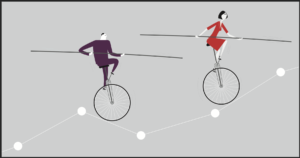
I recently bought a pair of the new lightweight wide-leg jeans. When I checked out, I commented to the salesman how comfortable the jeans were and said, “I sure hope they are in style for a while.” He responded, “I think they will be in style for a long time; people are over skinny jeans and heels.”
I’ve been thinking about his comment ever since. For me, it’s a metaphor for the changes people have been choosing since the pandemic. And, his comment is a reminder that it’s not changing back.
I hear a lot of talk about how, before the pandemic, the baby boomer perspective was the norm; we adapted our personal lives to our business lives. Post-pandemic, Gen Zers have made it clear that work must adapt to their personal lives.
While on the one hand, some leaders of large companies are pushing for things to go back to the way they were before, at the same time, I am hearing from Boomer and Gen X clients who say they want the same thing the Zers want.
Part of my You Pivot™ Program includes a section on defining What Matters. These days clients clearly state that What Matters includes prioritizing family, spiritual, and other activities that make for a full life. More than ever before, I am hearing, “Whatever professional endeavor I do next, I want more than the 80-90% work focus I had before.”
Time will tell how this unfolds, but my salesman may be right: most people are over skinny jeans.









 The initial results of my Pivot are excellent. I feel I have much greater clarity regarding the next 3-5 years..
The initial results of my Pivot are excellent. I feel I have much greater clarity regarding the next 3-5 years.. 